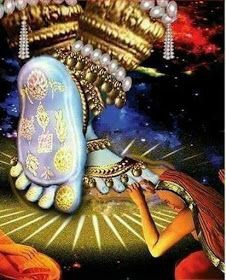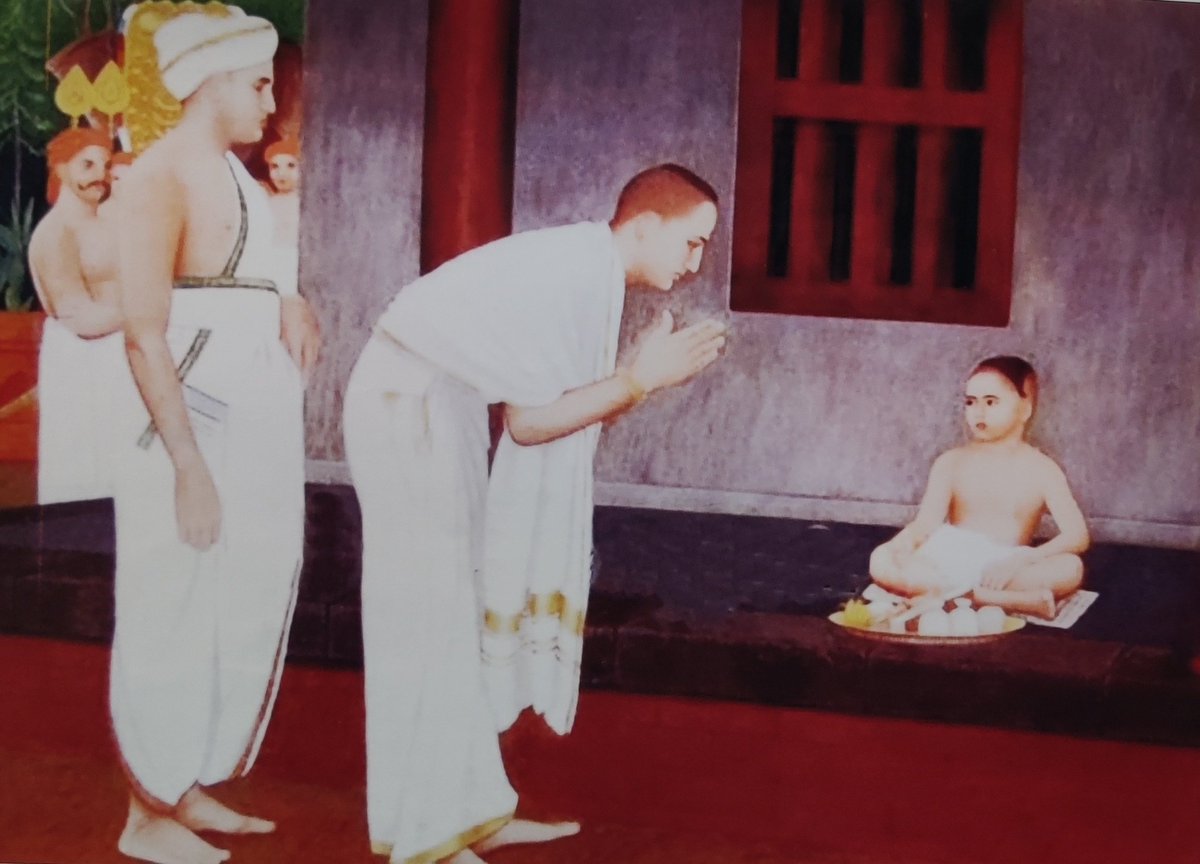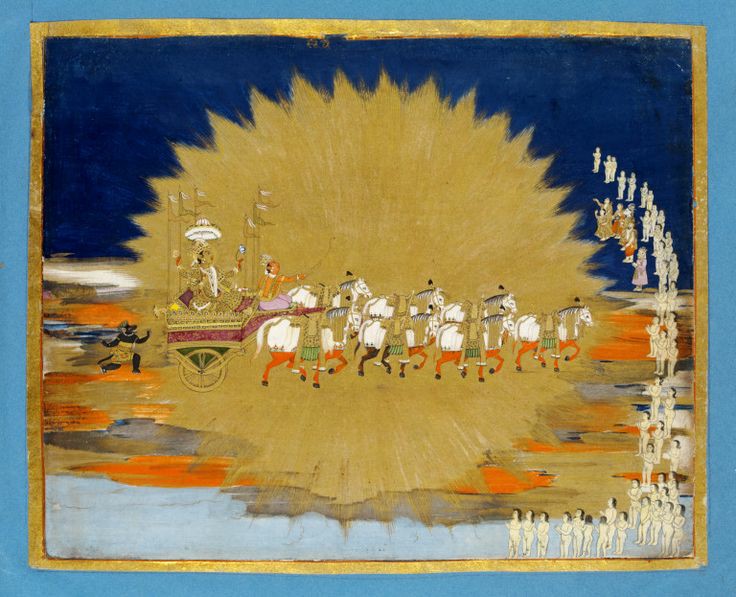
NĀRADA & HIS BHAKTI-SŪTRAS :
Bhakti – Love Divine :-
Uniqueness of Love Divine (Sūtra 7 to 14)
The following eight sūtras bring out clearly the exclusive nature of the Love Divine.
#Thread
Bhakti – Love Divine :-
Uniqueness of Love Divine (Sūtra 7 to 14)
The following eight sūtras bring out clearly the exclusive nature of the Love Divine.
#Thread

Sūtra 7
सा न कामयमाना। निरोधरूपत्वात्॥ ७॥
Love is its own fulfilment.
To a devotee there is no desire, not even the desire for his own Liberation. Love justifies itself. His only desire is for the love of his heart’s beloved, the Lord. Love is a reward in itself.
सा न कामयमाना। निरोधरूपत्वात्॥ ७॥
Love is its own fulfilment.
To a devotee there is no desire, not even the desire for his own Liberation. Love justifies itself. His only desire is for the love of his heart’s beloved, the Lord. Love is a reward in itself.

What exactly then is the nature of this renunciation in a devotee?
Thus is being described in the following two sūtras.
Sūtra 8
निरोधस्तु लोकवेदव्यापारन्यासः॥ ८॥
This renunciation, indeed, is in the total giving up of all secular & religious
Thus is being described in the following two sūtras.
Sūtra 8
निरोधस्तु लोकवेदव्यापारन्यासः॥ ८॥
This renunciation, indeed, is in the total giving up of all secular & religious

activities.
A divine lover’s mind can never wander away into any other object of fascination. To him everything reminds but the all-pervading Nārāyaṇa.
This kind of an all consuming sweet love for the Lord is nowhere so completely exemplified as in the love of the gopīs for
A divine lover’s mind can never wander away into any other object of fascination. To him everything reminds but the all-pervading Nārāyaṇa.
This kind of an all consuming sweet love for the Lord is nowhere so completely exemplified as in the love of the gopīs for

the blue-boy of Vrindavan.
Every moment of his existence, in every thought of his heart, he is constantly at His feet. To an individual who is thus living in unbroken memory of the Lord of his heart, even his
Every moment of his existence, in every thought of his heart, he is constantly at His feet. To an individual who is thus living in unbroken memory of the Lord of his heart, even his

very existence is a constant oblation of love at the altar of the Lord.
Continuing the explanation of the nature of renunciation that is love, Devaṛṣi Nārada says:
Sūtra 9
तस्मिन्ननन्यता तद्विरोधिषूदासीनता च॥ ९॥
In the Lord wholehearted, single-minded devotion, and in all
Continuing the explanation of the nature of renunciation that is love, Devaṛṣi Nārada says:
Sūtra 9
तस्मिन्ननन्यता तद्विरोधिषूदासीनता च॥ ९॥
In the Lord wholehearted, single-minded devotion, and in all

else that are contrary to it (devotion), complete indifference – This is the nature of renunciation (nirodha).
Continuing the description of ‘renunciation’ (nirodha) hinted at in the previous sūtra, here Nārada emphasises what exactly is nirodha. Single-hearted, complete
Continuing the description of ‘renunciation’ (nirodha) hinted at in the previous sūtra, here Nārada emphasises what exactly is nirodha. Single-hearted, complete

identification with the Lord of d heart. A true devotee sees no charm in the objects of the world, as his entire attention is engaged in d pursuit of d eternal enchanter, Śrī Nārāyaṇa. Thus he becomes indifferent to everything else other than d contemplation of Him&His glories. 

Now, what exactly is this exclusive devotion or this wholehearted Love Divine (ananyatā) is explained in the following sūtra.
Sūtra 10
अन्याश्रयाणां त्यागोऽनन्यता॥ १०॥
Renunciation of all other support is whole heartedness(in devotion).Here in this sūtra the term
Sūtra 10
अन्याश्रयाणां त्यागोऽनन्यता॥ १०॥
Renunciation of all other support is whole heartedness(in devotion).Here in this sūtra the term

‘single pointedness’
(ananyatā)employed in d previous sūtra,is being clearly explained.When a mind is exclusively single pointed in d contemplation of d Lord,that mind seeks no shelter from dissatisfaction in any other object of d world.
(ananyatā)employed in d previous sūtra,is being clearly explained.When a mind is exclusively single pointed in d contemplation of d Lord,that mind seeks no shelter from dissatisfaction in any other object of d world.

A sincere devotee sees the whole universe as the very form of his beloved.
In an earlier sūtra, Devaṛṣi Nārada had used a term ‘indifference’ (udāsīnatā) which he had not explained. To all those who demand a clarification of this term we have the needed explanation here in the
In an earlier sūtra, Devaṛṣi Nārada had used a term ‘indifference’ (udāsīnatā) which he had not explained. To all those who demand a clarification of this term we have the needed explanation here in the

following sūtra. What then is this ‘indifference’ that is to be maintained in order to cultivate the wholehearted devotion (ananyatā)?
Sūtra 11
लोकवेदेषु तदनुकूलाचरणं तद्विरोधिषूदासीनता॥ ११॥
To perform all secular & religious functions that are congenial to Him and (to have)
Sūtra 11
लोकवेदेषु तदनुकूलाचरणं तद्विरोधिषूदासीनता॥ ११॥
To perform all secular & religious functions that are congenial to Him and (to have)

total indifference to all actions that are hostile to Him . . . (that is ‘indifference’).
To one who has intense wholehearted devotion to the Lord, total rejection of all activities hostile to this all-consuming love is not only easy, but is certainly natural. It becomes almost
To one who has intense wholehearted devotion to the Lord, total rejection of all activities hostile to this all-consuming love is not only easy, but is certainly natural. It becomes almost

impossible for a devotee to undertake any activity which is detrimental to his Love Divine.
Does the plea of devotion sanction disobedience to the scriptural teachings? Śri Nārada explains:
Sūtra 12
भवतु निश्चयदार्ढ्यादूर्ध्वं शास्त्ररक्षणम्॥ १२॥
After having thus decided to
Does the plea of devotion sanction disobedience to the scriptural teachings? Śri Nārada explains:
Sūtra 12
भवतु निश्चयदार्ढ्यादूर्ध्वं शास्त्ररक्षणम्॥ १२॥
After having thus decided to

live the life of wholehearted devotion, let there be protection of the scriptural teachings.
After committing to live a dedicated life of total devotion unto d Lord, the devotee should not give up d rules of conduct laid down,&d practices of devotion prescribed by d scriptures.
After committing to live a dedicated life of total devotion unto d Lord, the devotee should not give up d rules of conduct laid down,&d practices of devotion prescribed by d scriptures.

But why should we obey the śāstra? Why cannot a devotee, who has surrendered himself to the Lord, live freely obeying none other than d promptings that rise in his own heart? Such a doubt is possible in d heart of a student and therefore, Devarṣi Nārada gives d following sūtra. 

Sūtra 13 अन्यथा पातित्याशाङ्कया॥ १३॥
Or else, there is the fear of a fall (from the spiritual path).
There is always a continuous pull of the mind and the senses, upon d devotee, to bring him down into his old habit of living, a life of d sense enjoyments, prompted entirely
Or else, there is the fear of a fall (from the spiritual path).
There is always a continuous pull of the mind and the senses, upon d devotee, to bring him down into his old habit of living, a life of d sense enjoyments, prompted entirely

by his ego & egocentric desires.
If the śāstras are to be followed only so long as we are conscious of the outer world, are there any duties that we must do even after the highest experience?
Devarṣi Nārada indicates:
Sūtra 14
लोकोऽपि तावदेव किन्तु भोजनादि-
If the śāstras are to be followed only so long as we are conscious of the outer world, are there any duties that we must do even after the highest experience?
Devarṣi Nārada indicates:
Sūtra 14
लोकोऽपि तावदेव किन्तु भोजनादि-

व्यापारस्त्वाशरीरधारणावधि॥ १४॥
The worldly duties in d various social contacts are also to be performed only to that extent (so long as d consciousness of d external world continues with us), but activities such as eating & so on indeed will continue as long as d body exists.
The worldly duties in d various social contacts are also to be performed only to that extent (so long as d consciousness of d external world continues with us), but activities such as eating & so on indeed will continue as long as d body exists.
We are told in the previous sūtra that the outer worldly behaviour is to be guided by the rules laid down in the śāstra, till the body-consciousness leaves the seeker completely. All the selfless dedicated exercises prescribed in the textbooks of devotion encourage, improve & 

cultivate, more & more devotion in the seeker.
Conclusion Remarks :-
A true devotee lives a life of total surrender, entirely centered in Him, whom he has experienced in his own heart. Everything else becomes unimportant, & such a devotee becomes totally committed to a
Conclusion Remarks :-
A true devotee lives a life of total surrender, entirely centered in Him, whom he has experienced in his own heart. Everything else becomes unimportant, & such a devotee becomes totally committed to a

God-centred existence.
II नारायण नारायण नारायण II
@RituRathaur @ikkmurugan @Mishti_in @shallakaul @youngndharmic @BeenaPP1 @first_desi @ThtKashmiriGuy @KashmiriPandit7 @JyotiKarma7
@TiwariNivedita @Anku_5789
@Vyasonmukh @RathvaS7 @Aneelgs @SlickIndo @VParamaguru1 @ArmyKaFan
II नारायण नारायण नारायण II
@RituRathaur @ikkmurugan @Mishti_in @shallakaul @youngndharmic @BeenaPP1 @first_desi @ThtKashmiriGuy @KashmiriPandit7 @JyotiKarma7
@TiwariNivedita @Anku_5789
@Vyasonmukh @RathvaS7 @Aneelgs @SlickIndo @VParamaguru1 @ArmyKaFan

@JyoitaS @Manushi64428902
@Mahesh8524 @ignisfatuus1110
@LostTemple7 @desi_thug1 @InfoVedic @GeetaRaavi @MNageswarRaoIPS @Isha_Sattva @itishree
@Kachnarr @AyushJ_1604 @Kr_RatanSinghs @Dil_Se_Ree @DrVikasPadha @Naive_rookie @apparrnnaa @LokaGatha @pokaabhii @Mahakal_k_Bhakt
@Mahesh8524 @ignisfatuus1110
@LostTemple7 @desi_thug1 @InfoVedic @GeetaRaavi @MNageswarRaoIPS @Isha_Sattva @itishree
@Kachnarr @AyushJ_1604 @Kr_RatanSinghs @Dil_Se_Ree @DrVikasPadha @Naive_rookie @apparrnnaa @LokaGatha @pokaabhii @Mahakal_k_Bhakt
@RajeAiyer @bhat200
@RamFcSoni
@chalotweetkaro
@AdityaR96542358 @RajeshPushkarji @BesuraTaansane
@BangadVedant @Manasi71 @IndiaTales7 @BharadwajSpeaks
@BharathiKumar4 @murthy_sowjanya @Jaythirdattempt @i_ragvendra @tvitterministry @moolyacoin @krishna76435679 @katti_mohan
@RamFcSoni
@chalotweetkaro
@AdityaR96542358 @RajeshPushkarji @BesuraTaansane
@BangadVedant @Manasi71 @IndiaTales7 @BharadwajSpeaks
@BharathiKumar4 @murthy_sowjanya @Jaythirdattempt @i_ragvendra @tvitterministry @moolyacoin @krishna76435679 @katti_mohan
@BHARATIYASEEKER @World_neptuner
@SaugataChaterje
@DeepaShree_AB
@Kaalateetham @priya_27_
@DivineElement @Vedic_Alok
@ajaypshetty
@OnEternalVigil
@Goldenthrust
@Priyamvada22S @paperrose3k @_myselfjolly @UshaNirmala @RudraaShiv @pranitasubhash @BangadVedant
@SaugataChaterje
@DeepaShree_AB
@Kaalateetham @priya_27_
@DivineElement @Vedic_Alok
@ajaypshetty
@OnEternalVigil
@Goldenthrust
@Priyamvada22S @paperrose3k @_myselfjolly @UshaNirmala @RudraaShiv @pranitasubhash @BangadVedant
• • •
Missing some Tweet in this thread? You can try to
force a refresh

















